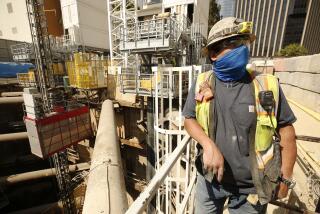On the road, Obama stresses aid to small firms
- Share via
Reporting from Washington — President Obama, continuing his pivot to small businesses and the economy, went on the road Tuesday to promote a proposal that would take $30 billion repaid by bailed-out Wall Street institutions and use it to fund community bank loans to small firms.
The proposal seeks to ease the unusually tight credit that many small businesses have experienced since the recession -- and have blamed as a major barrier to hiring.
It comes on the heels of an Obama plan last week to give up to $5,000 in tax credits to companies for every new employee this year. Both proposals would require congressional action and are part of the president’s shift in focus to small businesses in a bid to fire up America’s dormant job machine as well as his political standing.
“We’re going to start where most new jobs do -- with small businesses,” Obama said at a town hall meeting in Nashua, N.H., repeating a statement he made in his State of the Union address last week.
“All this,” he said of his proposals, “will help small banks do even more of what our economy needs -- and that’s ensure that small businesses are once again the engine of job growth in America.”
Small businesses historically have led the economy in job creation coming out of recessions, but many of them have been reluctant to add new workers in the face of weak sales, uncertainties about the economic recovery and future legislation and the difficulties of obtaining financing in the wake of the deep financial crisis.
The credit constraint was underscored in a Federal Reserve survey released Monday. Though banks have largely stopped tightening lending standards, the report said, they were more apt to raise hurdles for small-business borrowers than big corporate ones. What’s more, the Fed’s quarterly survey of senior loan officers found that smaller banks -- which lend mostly to smaller firms -- still were more likely to toughen standards.
Banks have blamed some of the tightening on stronger pressures from regulators after the credit binge of several years ago.
But the financing situation for small businesses has been particularly acute in part because many of them own property, and in the aftermath of the real estate bust, they lost a key collateral for loans. And many self-employed people rely on home equity loans and personal credit cards to support their businesses -- and those credit lines have been slashed in the last year.
Obama’s proposal would provide capital for community banks, defined as those with assets of no more than $10 billion, of which there are about 8,000.
Small-business experts said that a greater flow of credit, like payroll tax credits, would help but in themselves wouldn’t be enough for many firms that are struggling mostly with anemic sales.
William Dunkelberg, an economist for the National Federation of Independent Business, a small-business lobbying group, said his surveys of employers suggested that poor sales are by far the top reason most are not hiring. The Fed survey confirmed that business demand for credit remained weak, particularly from small companies.
“It’s purely the lack of sales,” said Phil Kenny, a owner of Trucks Unique Inc., a 13-employee firm in Albuquerque that modifies commercial trucks.
Kenny sees some faint signs that business conditions are improving but says he won’t begin to add workers until the outlook becomes clearer.
“There’s a lot of anxiety among customers and business owners,” he said. In addition to the economy, “the uncertainty with respect to what’s going to be happening with taxes, healthcare and everything else, that’s caused anxiety. So you stand still and wait to see what happens.”
John Herring, chief lending officer at Liberty Bell Bank in southern New Jersey, a four-branch bank with assets of $170 million, agreed. “The main problem we’re having is not turning people away but finding people to lend to,” he said.
But other business owners say easier access to credit would help them expand -- and hire. And with Obama, lawmakers and many others in Washington chanting the call for job-creation programs, small businesses can expect more support. In his State of the Union address, Obama said he would help small firms boost exports, and he is also pushing Congress to adopt a job-creation package.
The House last fall passed a $44-billion bill that would boost the cap on federal loan-guarantee programs available through the Small Business Administration.
With funds from last year’s $787-billion stimulus package, the SBA has helped more than 42,000 small companies with loans, about 13,600 of them new businesses, said Jonathan Swain, an SBA assistant administrator.
Senate Democrats are expected to unveil their own job-creation proposals soon. Senate Majority Leader Harry Reid of Nevada said that would include a job-creation tax credit, funding for infrastructure projects, tax breaks for small business and an expansion of federal bonds to subsidize state and local construction.
Reid said the Senate probably would pursue Obama’s “cash for caulkers” proposal to provide incentives for people to weatherize homes. Though the House late last year passed a single comprehensive jobs bill, Reid said the Senate would act on a series of measures.
Rep. Joe Courtney (D-Conn.) agreed with populist criticisms that small businesses haven’t received as much attention as big corporations.
“I think over the last year, that probably describes who’s been getting the most face time with the president’s economic advisors,” said Courtney, who has been pushing for emergency direct federal loans to entrepreneurs. “We have to allow people to chase their dreams and create new enterprises that will get us out of this downturn.”
Obama’s shift to small business is part of his renewed focus on job growth amid deep public anxiety about double-digit unemployment. The jobless rate is widely expected to inch up in the coming months as more people reenter an economy that is growing again. And it looms as a huge liability for Democrats in the midterm elections in November.
Obama’s poll numbers have plummeted over the last year as he worked feverishly to pass a healthcare plan that most Americans viewed as a peripheral concern. Alarmed by the Republican pickup in Massachusetts, the White House is using nearly every public appearance to cast Obama as a feisty warrior for an anxious middle class.
At the town hall meeting Tuesday in New Hampshire, Obama reiterated that though the specter of a second Great Depression has passed, “the devastation remains. . . . That’s why jobs have to be our No. 1 focus in 2010.”
Coming to Nashua the day after releasing his $3.8-trillion budget, Obama sought to ease public concerns about a deficit now in excess of $1 trillion. He mentioned that he would create, by fiat, a bipartisan commission that would seek ways to reduce the deficit in the coming years.
Partisan gamesmanship is obstructing sincere efforts to cut the deficit, he said. He mentioned Senate Republicans who in the past had favored such a commission but withdrew their support once Obama endorsed it.
“It’s one thing to have an honest difference of opinion on something. There’s nothing wrong with that,” he said. “But you can’t walk away from your responsibilities to confront the challenges facing this country because you think it’s good short-term politics. We can’t afford that.”
peter.nicholas@latimes .com
More to Read
Inside the business of entertainment
The Wide Shot brings you news, analysis and insights on everything from streaming wars to production — and what it all means for the future.
You may occasionally receive promotional content from the Los Angeles Times.











